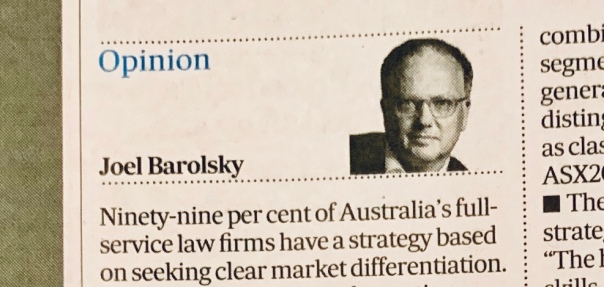Stop trying to differentiate your firm
I published a shorter version of Stop trying to differentiate your firm in The Australian Financial Review on 3 May 2019 and later the full text as on my blog, Relationship Capital.
Editor: Joel provocative opening paragraph struck a nerve: “99% of Australia’s full-service law firms have a strategy based on seeking clear market differentiation. In my view, they’re largely wasting their time and money.” So it’s a pleasure to bring the full text to readers of Dialogue.

AFR Legal Affairs op-ed
Conventional strategy thinking suggests there are two sources of sustainable competitive advantage: [1] having the lowest cost, or [2] differentiating from competitors on things that matter most to customers. The former strategy allows firms to win by having greater price-setting discretion. The latter strategy allows firms to extract a price premium for added benefits.
When it comes to the legal market, this theory starts to get a bit wobbly.
Research shows that while most law firm clients can distinguish firms between groups of firms, such as Tier 1 versus Tier 2 or domestic versus global, they really struggle to clearly discriminate between specific full-service firms within a group. To clients, many of these firms look and feel the same.
One of the reasons for this is market fragmentation. Unlike most industries with three or four dominant players (think airlines, grocery retail or banking), the Australian commercial legal market has nearly 30 firms claiming in some way to be leaders in legal expertise and client focus. Australia’s largest law firm by partner number, HWL Ebsworth, has less than 5% share of the total market. Carving out and keeping a unique and relevant market position in such a crowded market is next to impossible.
Another reason for a lack of differentiation is a self-inflicted one. Most full-service firms present themselves as being all things to most people. Within the partnership model, it’s political suicide not to give every partner a guernsey in describing what the firm is really good at.
So, what’s the solution?
The first part of the answer is to worry less about being known for being different and focus more on just being known. Strong brand awareness still counts in opening doors and staying top-of-mind.
The second part is to encourage more differentiation at the practice, partner and/or product level. With a more micro approach, differentiation usually comes from legal specialisation combined with a focus on a particular market segment or industry. So, for example, a general commercial litigation team can distinguish themselves by positioning as class action defence specialists for ASX200 companies.
The third element is to concentrate firm strategy on how the firm competes. ‘The how’ refers to the resources, skills, standards and systems used to win. These are collectively called capabilities, or as Pier D’Angelo, Allens’ Chief Strategy Officer, calls them, the organisation’s “muscles”.
Most full-service law firms need to work on these five muscle groups and the interplay between them:
1. Firm and team leadership – setting and aligning everyone around a clear direction; inspiring others to meet/exceed expectations; and providing support with accountability.
2. Talent management – recruiting, developing, engaging and retaining the right workforce for the firm to flourish, both now and in the future.
3. Winning work and capturing value – developing trusting relationships with clients and referrers; converting more of the right opportunities, and pricing profitably.
4. Collaboration – shifting the mindset from ‘my’ to ‘our’ client and combining expertise from inside and outside the firm to solve clients’ wicked problems.
5. Operating with discipline – having an efficient and effective operating platform; ensuring adherence to agreed policies; executing plans consistently; and optimising leverage and utilisation.
Spending more time at the law firm gym will, over time, create a form of cultural and operational distinctiveness. Paradoxically, this will most likely be reflected externally and create a firm that both top clients and top people will want to work with and for. They will be authentic points of difference not created by spin doctors but radiating from a firm truly fit for the future.
Author
 Joel Barolsky is Managing Director of Barolsky Advisors and Senior Fellow of The University of Melbourne. He has worked with over 100 of Australia and New Zealand’s top professional service firms as a strategy advisor and facilitator. Joel is the lead author of the 2018 Thomson Reuters Peer Monitor Melbourne Law School State of the Legal Market Report.
Joel Barolsky is Managing Director of Barolsky Advisors and Senior Fellow of The University of Melbourne. He has worked with over 100 of Australia and New Zealand’s top professional service firms as a strategy advisor and facilitator. Joel is the lead author of the 2018 Thomson Reuters Peer Monitor Melbourne Law School State of the Legal Market Report.
Joel was a Principal of Beaton Research + Consulting for many years. For further details go to http://www.barolskyadvisors.com
Stop trying to differentiate your firm was first published in Relationship Capital on 6 May 2019.
For another perspective on differentiation…
…read Heather Suttie‘s post on Dialogue The value of legal market positioning


Thank you Joel for your contribution. I fully agree with your thougths, which in my opinion do not only apply to the Australian legal environment, but also to the Argentinean. Kind regards from Buenos Aires, Argentina